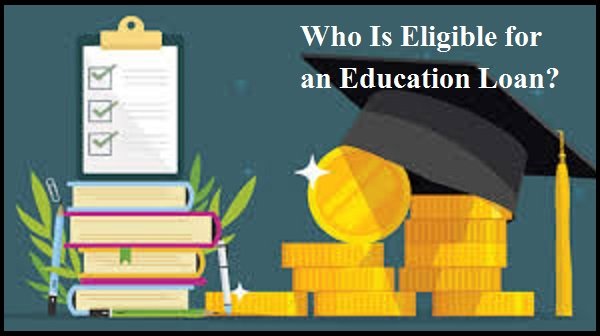
Introduction – Who Is Eligible for an Education Loan?
Who Is Eligible for an Education Loan -: For students seeking higher education, education loans are an essential financial aid option. These loans offer the money required to pay for tuition fees, lodging charges, and other educational-related costs. To guarantee a seamless loan application procedure, it is crucial to comprehend the requirements for qualifying for school loans.
Eligibility Criteria for Education Loan
A. Age and Citizenship Requirements
• Applicants must typically be Indian nationals.
• Lending institutions may have a different maximum age limit than the minimum age requirement of 18.
• NRI students from India may also be eligible for education loans from several banks.
B. Educational Background and Course Eligibility
• Education loans are available for a variety of courses, including undergraduate, postgraduate, vocational, and certificate programs.
• The courses and institutes must be recognized by government agencies or regulatory bodies.
C. Admission to Recognized Institutes
- Applicants must have secured admission to a recognized institute before applying for the loan.
- The admission letter is a crucial document required during the loan application process.
D. Credit Score and Financial History
• A strong credit score increases the likelihood that a loan will be approved and may result in reduced interest rates.
• Lenders evaluate applicants’ creditworthiness based on their credit scores and financial histories.
E. Co-signer or Collateral
• In order to increase their loan eligibility, students with a spotty credit history or poor credit scores may need a co-signer, such as a parent or legal guardian.
• Additionally, submitting collateral in the form of real estate or fixed deposits might improve eligibility.
Types of Education Loans – Who Is Eligible for an Education Loan?
A. Government-Funded Student Loans
• Government agencies and banks provide student loans with subsidised interest rates and flexible payback options.
• Government-funded loan eligibility requirements vary depending on the plan.
B. Private Education Loans
• Private financial organisations provide education loans with a range of interest rates and repayment alternatives.
• Eligibility requirements for private loans may differ from those for government loans.
C. Educational Loan for International Students
• Some banks and financial organisations provide education loans to overseas students studying in India.
• Eligibility conditions for international students may differ, including the need for an Indian co-signer.
Documents Required for Education Loan Application
A. Personal Identification Documents
• An official government-issued ID such as an Aadhar card, passport, voter ID, or another type of identification.
B. Academic Records
• Certificates and mark papers from prerequisite exams.
C. Course Admission Letter
- Proof of admission to the selected course and institute.
D. Income Proof and Bank Statements
- Documents showing the income and financial stability of the applicant or co-signer.
E. Co-signer Documents (if applicable)
- ID proof, address proof, and income documents of the co-signer (if required).
Step-by-Step Guide to Applying for an Education Loan
A. Research and Compare Loan Options
• Explore various education loan options offered by different lenders.
• Compare interest rates, repayment terms, and additional benefits.
B. Check Eligibility Criteria
• Review the eligibility criteria of shortlisted lenders to ensure you meet the requirements.
• Consider factors like course eligibility and co-signer requirements.
C. Gather Required Documents
• Collect all necessary documents, including identification, academic records, and admission letter.
D. Apply Online or Offline
• Most lenders offer online application processes for convenience, but offline options may also be available.
E. Submit the Application Form
• Complete the application form completely, and attach any necessary supporting documentation.
To prevent mistakes, double-check the form before submitting it.
F. Require approval before disbursement
• The lender will check the papers and application after submission.
• The loan amount will be paid out to the institution or the applicant’s bank account if it is accepted.
Tips to Improve Eligibility for an Education Loan
A. Build a Good Credit History
- Pay bills and credit card dues on time to maintain a positive credit history.
- Avoid defaulting on loan payments or having too much debt.
B. Maintain a Strong Academic Record
- Good academic performance reflects responsibility and increases credibility for loan approval.
C. Choose Recognized Institutes and In-Demand Courses
- Opt for courses and institutes that have a good reputation and higher employability prospects.
D. Add a Co-signer or Provide Collateral
- If facing challenges with eligibility, consider involving a co-signer or providing collateral.
Conclusion
Securing an education loan can be a lifeline for students aspiring to achieve their academic dreams. By understanding the eligibility criteria and following the necessary steps, students can access financial aid to support their educational journey and create a successful future.
SBI Car Loan: Your Ultimate Guide to Securing the Best Car Loan
LATEST POSTS
- Homemade Veg Pizza Recipe | Veggie Pizza Recipe: “घर पर बनाएं स्वादिष्ट वेज पिज़्ज़ा: आसान और मज़ेदार रेसिपी”
- Jodhpur News 26 July 2024: जाने जोधपुर में आज सोने, चांदी, पेट्रोल और डीजल की कीमतों के भाव के साथ जोधपुर की ताजा खबर
- SBI Vacancy 2024 – SBI में नौकरी पाने का शानदार अवसर, नहीं देनी होगी लिखित परीक्षा, 85000 से अधिक है मंथली सैलरी
- Lemon Rice Recipe (Tangy Flavorful Rice): “टैंगी फ्लेवर के साथ बनाएं यह खास लेमन राइस”
- Jodhpur News 25 July 2024: जाने जोधपुर में आज सोने, चांदी, पेट्रोल और डीजल की कीमतों के भाव के साथ जोधपुर की ताजा खबर
